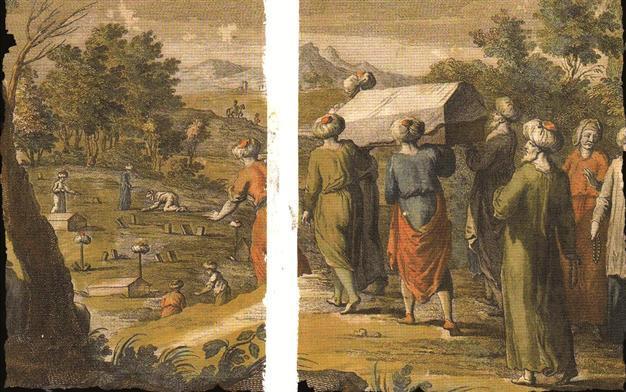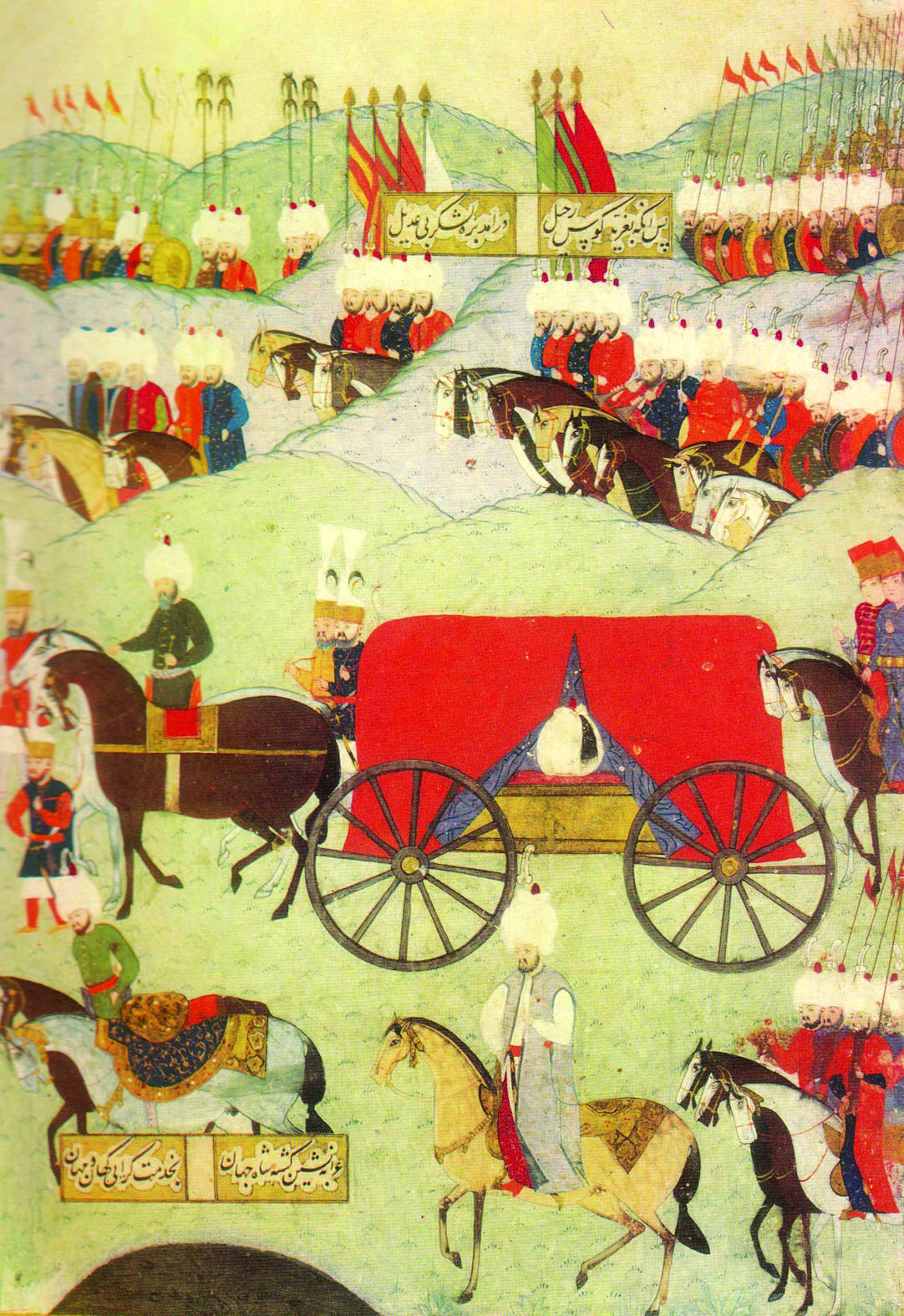Death, dying and martyrdoom
Niki Gamm

A funeral procession. Engraving by Bermant Picart.
“Every soul will taste of death. And you will be paid your reward fully only on the day of resurrection.” (Quran 3:184). Translations by Maulana Muhammed Ali] “Every soul must taste of death; then to Us you will be returned.” (Quran 29:57)
In Islam, death does not result in a final ending, but opens the way to a different or higher form of life, according to the late Maulana Muhammed Ali, a Pakistani writer and scholar. This transition depends on the deeds the individual has done. If he or she has done good deeds, he or she goes to Paradise; however, if they have done bad things, they will suffer in Hell. It is debatable whether that individual stays in Hell for eternity or is allowed out by God’s will.
When an individual is at the point of dying, an angel or archangel known as the “Angel of Death” is assigned to remove the soul from the body. “The angel of death, who is given charge of you, will cause you to die, then to your Lord you will be returned.” (Quran 32:11) The journey of the dead soul to heaven is taken up in the hadith, or traditions concerning the life and sayings of the Prophet Muhammad. This is not unlike present-day accounts of near-death experiences in which the individual is escorted along a path by an unseen presence and is asked such questions as to who he or she is.
Under normal circumstances family members and friends would be with the dying person and encourage that person to say the Fatiha, or opening verses of the Quran in their shortened form known as the shahada – “There is no god but God,” as these might be his last words. The word “shahada” means bearing witness, in this case that only God exists and Muhammad is his prophet. They should also remind the dying person of his or her good deeds and God’s mercy to give them hope of the afterlife.
When the person is confirmed dead, family members, or those who are present, perform a series of tasks that start with closing the deceased’s eyes and then hurrying to prepare the body for washing, shrouding and burial. The washing was usually done in a special room set aside in mosques, and Topkapı Palace even has one that was used for the women of the harem who died there.

The bodies of martyrs, however, are not washed on the grounds, but are buried in the clothes in which they died, although they are usually wrapped in a blanket or other type of cloth until they are actually buried. Because they were martyred for God’s cause, they immediately enter Paradise, according to Islam.
MartyrdomThe word “shahada” has been wrongly translated in the West as becoming a martyr, “shahid.” The person is a witness to the way of God and if they die in battle, some believe they are immediately brought to the garden of Paradise, although hadith suggests they reside in some special place there.
“And think not of those who are killed in God’s way as dead. Nay, they are alive, being provided sustenance from their Lord. Rejoicing in what God has given them out of His grace, and they rejoice for the sake of those who, [being left] behind them, have not yet joined them, that they have no fear, nor shall they grieve.” (Quran 3: 168-169)
Along the way, however, the word “shahid” has been confused, again in translation, with the concept of a suicide bomber. However, suicide is completely forbidden in Islam. The bomber does not believe he is committing suicide; he is bearing witness to his faith in God. Just how this pertains to women is not clear since generally it is considered that only men can become shahids. Still, in Islam a woman might become a shahida if she died during the fulfillment of a religious command.
Prof. W.H. McNeill, in “The Rise of the West” pointed out, “The further conviction that death [by] fighting in God’s cause assured immediate access to Paradise gave an additional dash of recklessness to each warrior’s charge.” The Prophet Muhammad is supposed to have encouraged a young man in his entourage with such words.
In actuality, it does not matter how a Muslim dies. “And those who flee in God‘s way and are then slain or die, God will certainly grant them a goodly sustenance. And surely God is the Best of providers.” (Quran 22:58) The reference may be to the flight of the faithful from Mecca for the second time.
According to hadith, martyrdom might also come from an abdominal illness, drowning, a falling wall, plague, defending one’s home, childbirth – if he or she believes in God and has been a good person, he or she goes to Paradise.
As for the beautiful women (houris) that are supposed to be waiting for the “martyr,” there has been considerable debate over the centuries whether this is meant in a figurative sense or possibly signifies something else entirely. The houris are mentioned in the Quran, possibly as angels and are equally available to women, as well as men, and not exclusively to martyrs. “Thus [shall it be]. And We shall join them to pure, beautiful ones.” (Quran 44:54) There are also references to men with their wives in Paradise and the interpretation is that having sex is not among the benefits. The hadith, on the other hand, are much more explicit on what the houris look like, but these descriptions were collected centuries after the death of the Prophet Muhammad and appear to be embellishments.

 The bodies of martyrs, however, are not washed on the grounds, but are buried in the clothes in which they died, although they are usually wrapped in a blanket or other type of cloth until they are actually buried. Because they were martyred for God’s cause, they immediately enter Paradise, according to Islam.
The bodies of martyrs, however, are not washed on the grounds, but are buried in the clothes in which they died, although they are usually wrapped in a blanket or other type of cloth until they are actually buried. Because they were martyred for God’s cause, they immediately enter Paradise, according to Islam.